MG ZS review – even better value than before
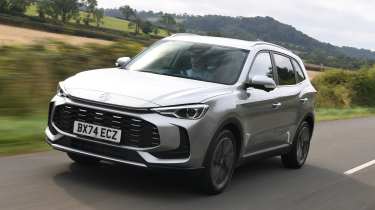
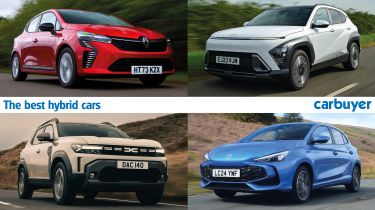
Hybrid cars are the gateway to cheaper fuel bills for many drivers. You can drive them just like a traditional petrol or diesel car, but a little electric assistance helps to improve fuel economy. There are more on the market today than ever before, so we’ve picked the top 10 best hybrids currently on sale to help you choose the right one for you.
First things first, it’s worth clarifying what we mean by ‘hybrid’ cars. The term has become a little confusing in recent years, with new types of hybrid technology cropping up, including mild hybrids and plug-in hybrids. You can read our hybrid explainer for a full breakdown of the differences, but we’re referring to conventional self-charging hybrid technology in this list.
 Top 10 best plug-in hybrids on sale today
Top 10 best plug-in hybrids on sale today
This fuel-saving tech was pioneered by cars like the Toyota Prius, which combined a petrol engine with a small battery and electric motor – now, though, that model is a plug-in hybrid only. Unlike plug-in hybrid vehicles which require you to charge them regularly, self-charging hybrids automatically recharge their batteries with help from the engine and regenerative braking as you drive. This means there’s no need for a charging point at home – just fuel up like you would any conventional car, but with the added benefit of improved efficiency.
What makes hybrid cars so appealing for many car buyers is their ability to deliver excellent fuel economy while still offering the convenience of a petrol engine. Plus, hybrid technology has become more affordable in recent years, becoming more accessible to a wider range of drivers. Hybrid engines are available in all sorts of cars, from tiny city cars to larger family SUVs, meaning there's a hybrid model to suit almost every need and budget.
Whether you're after lower running costs, reduced emissions, or simply want to dip your toe into electrified driving without the commitment of a fully electric vehicle, hybrid cars could offer the ideal balance. In this guide, we’ve rounded up the top 10 hybrid cars for 2025, so you can make an informed decision on which model suits you best.
This guide looks at a range of different bodystyles, but we also have lists of the best hybrid SUVs, best hybrid estate cars and the best hybrid and electric sports cars if you’re looking for something more specific. Or visit our guide to the best fully-electric cars if you’re ready to fully commit to battery power.
For now, read on to see the best self-charging hybrids on sale in the UK…
MG has made a name for itself in recent years with its excellent and affordable electric cars, and it’s now turned its attention to the hybrid market. We reckon the Chinese brand is on for a home run with the MG ZS – it’s practical, efficient and astonishingly affordable. You get more space than many of its small SUV rivals, respectable performance and fuel economy of up to 55.4mpg, all for less than the cost of many superminis.
Starting from just £22,000, the MG ZS Hybrid+ is great value no matter how you look at it. Sure, the old ZS was also cheap, but it lacked the polish and efficiency of the new model, let alone all of the new interior and safety tech. For family car buyers looking to keep fuel costs down, the MG ZS is absolutely worth a look in – so much so that we awarded it the Carbuyer Best Hybrid award for 2025.
| Pros | Cons |
|
|
Find new and used deals for the MG ZS on our sister site Auto Express
Like most new cars, the Honda Civic has grown in size slightly for what is now the long-running model’s eleventh generation. Apart from the Civic Type R hot hatchback, the new Civic is only available with a frugal self-charging hybrid powertrain. While not the most efficient hybrid powertrain available – Honda claims you’ll average around 56mpg – there’s plenty of punch from the 2.0-litre petrol engine. Overall, the Civic feels a lot more nimble on a twisty road than the equivalent hybrid SUV.
Step into the cockpit and you’ll soon realise the new Civic feels plusher than even a Volkswagen Golf. The overall design of the Civic’s cabin is sleek, simple and classy and everything you touch feels impeccably built. The aforementioned growth spurt means there’s more space for passengers in the back, while the Honda’s 410-litre boot dwarfs that of its German rival.
| Pros | Cons |
|
|
Find new and used deals for the Honda Civic on our sister site Auto Express
The Renault Clio may not be the first car that jumps to mind when you think ‘hybrid’, but this French supermini packs a trick E-Tech hybrid powertrain that makes it one of the most economical small cars you can buy. Top-spec Clio models boast a slick portrait infotainment screen, and every version benefits from a high quality interior with LED headlights, cruise control and Apple CarPlay and Android Auto functionality as standard.
While you can spend a bit less for a pure-petrol Clio, we think the added refinement, performance and efficiency of the hybrid model is worth the money – plus you can brag to your friends that it utilises much of the same technology as a Formula One car. The F1-derived clutchless automatic gearbox allows the Clio to drive in fully-electric mode at speeds of up to 40mph before the combustion engine kicks in. Altogether, it can manage a frugal 64.2mpg.
| Pros | Cons |
|
|
Find new and used deals for the Renault Clio on our sister site Auto Express
The Dacia Duster can do little wrong in our eyes at Carbuyer. The rugged small SUV offers some of the best value for money on the market today, delivering family practicality, intuitive tech and efficient engines in an affordable package. It’s hardly a shock that we named it Carbuyer Car of the Year in 2025 – we really do like it that much – but the hybrid model deserves special mention on this list.
Underneath, the hybrid Duster shares many of its mechanical components with the Renault Clio above, including its E-Tech hybrid engine. Sure, it does inflate the price of the Duster by a few thousand pounds, but at just over £24,000 it’s still very affordable. It will return up to 55.3mpg, and it’s just as competent at shuffling between petrol and electric power as the Clio.
| Pros | Cons |
|
|
Find new and used deals for the Dacia Duster on our sister site Auto Express
Among an array of similar-looking SUVs and crossovers, the bold styling of the Hyundai Tucson is a breath of fresh air. It also matches rivals for economy with low running costs, too. The self-charging hybrid version utilises a 1.6-litre petrol engine, mated to a small electric motor and battery, to give a combined output of 212bhp. These also give the Tucson the ability to run on electric power alone for short distances, while the electric motor assists the petrol engine to get you moving, meaning it can return fuel economy of around 50mpg.
The plus points for the Tucson don’t end there, either. Inside, it features a plethora of standard kit such as a large infotainment touchscreen with Apple CarPlay and Android Auto, dual-zone automatic air conditioning and automatic emergency braking (AEB). Practicality is also excellent, with a 616-litre boot and, like all Hyundais, the Tucson is covered by a comprehensive five-year, unlimited-mileage warranty for peace of mind.
| Pros | Cons |
|
|
Find new and used deals for the Hyundai Tucson on our sister site Auto Express
Lexus has been behind the curve in terms of technology for the past few years and at a glance, it looks like Lexus haven’t changed much with the supposedly ‘all-new’ NX. Thankfully, while the changes to the already striking exterior are subtle, the biggest differences come on the inside where the NX boasts Lexus’ latest infotainment system. This includes a slick new 14-inch touchscreen with digitised physical climate control dials. The rest of the interior reaffirms Lexus’ benchmark for high-quality materials and the spacious 521-litre boot is larger than offerings from BMW and Mercedes.
The NX shares its underpinnings with the less-expensive Toyota RAV4 and can be had with either self-charging or plug-in hybrid tech. The self-charging hybrid is the better value of the two, with the plug-in costing around £5,000 more. NX hybrid models use a 2.5-litre petrol engine, mated to two electric motors. The self-charging hybrid powertrain we favour can get the NX from 0-62mph in a brisk 7.7 seconds, and will achieve economy figures of up to 49.5mpg.
| Pros | Cons |
|
|
Find new and used deals for the Lexus NX on our sister site Auto Express
Given that the MG3 is mechanically identical to the MG ZS at the top of this list, it’s hardly surprising that it earns a spot as well. Just like its bigger SUV sibling, the MG3 offers practically unbeatable value for money. It starts from little over £18,000, yet packs a self-charging hybrid system with 192bhp. That’s approaching hot hatchback territory, giving the plucky 3 enough grunt to launch to 62mph in just eight seconds.
But hybrids are all about efficiency, and the MG3 delivers in this area, too. You’ll get up to 64mpg from its petrol engine and electric motor combination, which puts it right on par with the Renault Clio. The MG3 does sacrifice some points to its French rival when it comes to interior quality, however – there’s plenty of kit, but cost-cutting is more evident than in the Clio with some of the material choices. The boot and rear seats are also on the small side, which could put off some buyers looking for a more practical supermini. Still, for hybrid buyers on a budget, the MG3 could be the ideal fuel-sipping runaround.
| Pros | Cons |
|
|
Find new and used deals for the MG3 on our sister site Auto Express
The Hyundai Kona is one of the few cars on sale today available with either a petrol engine, a self-charging hybrid engine, or as a full EV. All are very capable, but for many buyers, it’s the hybrid that will be the pick of the range. It’s significantly more efficient than the petrol model but it’s not as expensive as the electric version, plus you still get the futuristic, steely-eyed looks that give it some serious road presence.
Importantly, the Hyundai Kona gets all the usual small SUV things right. It’s surprisingly practical for a car of this size – in fact, interior space isn’t far off the bigger Tucson SUV. Boot space is strong, too, while you get Hyundai’s five-year, unlimited-mile warranty for peace of mind. We’re big fans of the dashboard design in the Kona, as well. It has all the tech you could need, but there are still physical buttons for important controls which are easier to use on the move than a touchscreen.
If we’re nit-picking, the hybrid Kona does feel a bit lethargic – 127bhp isn’t a lot on paper, and it’s no better once on the road. Mind you, not many hybrid SUV buyers will be looking for out-and-out performance, and the Kona performs well enough in other areas to make up for this.
| Pros | Cons |
|
|
Find new and used deals for the Hyundai Kona on our sister site Auto Express
Let’s get the important number out of the way first – the Toyota Yaris can return up to 70.6mpg. Some of you hybrid car buyers will be won over already, but there’s more going for the Yaris besides its prodigious efficiency.
Toyotas have never been known for their styling, but the Yaris does well to stand out from the city car crowd. It’ll now attract buyers on its looks alone, rather than relying on the hybrid powertrain to steal sales from rivals – there’s even a racy-looking GR Sport model for those who like the high-performance GR Yaris’ styling, but still want the regular car’s hybrid economy and low running costs. It gets a small bump from 114bhp to 129bhp, too, while fuel economy is pretty much unchanged.
Improvements in battery tech mean the Yaris can drive on electric power alone for up to half the time at low speeds. As a result, you get that impressive 70.6mpg figure, which should help offset its slightly more expensive price compared to rivals. You won’t feel short-changed by the car’s refinement or comfort, either, as both are impressive.
| Pros | Cons |
|
|
Find new and used deals for the Toyota Yaris on our sister site Auto Express
Dacia has long been famed for offering cars that offer unbeatable value, although these have typically made use of basic combustion engines in order to keep costs down. In 2023, however, the practical, seven-seater Jogger became the first Dacia to get a hybrid powertrain, making the large family car even cheaper to run. While it’s the most expensive Jogger to buy, its £23,000 price tag means it’s one of the best-value hybrid cars you can buy.
To get the hybrid version, you’ll have to go for at least mid-spec Expression trim, but this is the one we’d go for anyway regardless of the powertrain, because it gets features such as an eight-inch infotainment display with Bluetooth and smartphone mirroring, front and rear parking sensors, automatic air con and keyless entry, meaning it feels a lot more modern than base Essential trim. The hybrid system gets 138bhp, making it even better suited to moving around up to seven occupants than the non-hybrid, and is more economical, getting up to 58.9mpg.
| Pros | Cons |
|
|
Find new and used deals for the Dacia Jogger on our sister site Auto Express
You’ll probably associate hybrid cars with the Toyota Prius, because it was one of the very first mainstream hybrids back in the late 1990s – and the subsequent models moved the game on again and again. These days, the Prius has been replaced by other hybrid cars and hybrid SUVs, while other manufacturers have developed their own hybrid powertrain technology in an effort to cut harmful tailpipe emissions.
Of course, the term ‘hybrid’ has been thrown around a lot in the last few years, meaning there are several kinds available to UK buyers. Our list of the best hybrid cars is mainly made up of what are called ‘self-charging’ hybrids; these utilise small electric motors that step in for short bursts to increase the petrol engine's efficiency and thus, reduce the amount you’ll spend on fuel. Thanks to a smaller battery and electric motor than a fully-electric car, self-charging hybrids are usually affordable to buy or lease, too.
Also available are plug-in hybrids (PHEVs), which manage a much greater distance on electric power alone, and their bigger batteries need to be recharged from a socket – however, these are usually a few thousand pounds more expensive to buy than their self-charging cousins. Mild-hybrid engines are also becoming increasingly popular, which are able to recuperate and reuse wasted energy under braking. This isn’t usually enough to propel the car on its own, but a small electric motor can take some strain off the combustion engine while you drive.
So which type of hybrid is best? That depends on your driving habits and budget, but all should save you money compared with a petrol or diesel model and tend to be less polluting.
You can compare the starting prices and Carbuyer scores of the 10 best hybrid cars using the table below.
| Best hybrid car ranking | Make and model | Priced from | Carbuyer rating (out of 5) |
| 1 | MG ZS | £22,000 | 4.1 |
| 2 | Honda Civic | £35,000 | 4.3 |
| 3 | Renault Clio | £19,000 | 4.4 |
| 4 | Dacia Duster | £19,000 | 4.2 |
| 5 | Hyundai Tucson | £32,000 | 4.5 |
| 6 | Lexus NX | £44,000 | 4.3 |
| 7 | MG3 | £18,000 | 4.3 |
| 8 | Hyundai Kona | £26,000 | 4.3 |
| 9 | Toyota Yaris | £23,000 | 4 |
| 10 | Dacia Jogger | £18,000 | 4 |
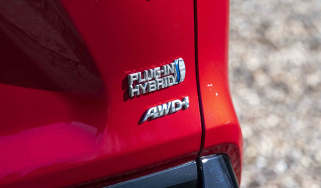
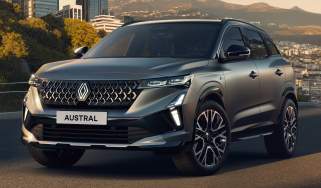
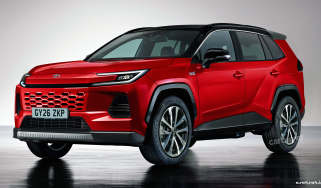

Suzuki’s new 10-year warranty is free – here’s how to get it


